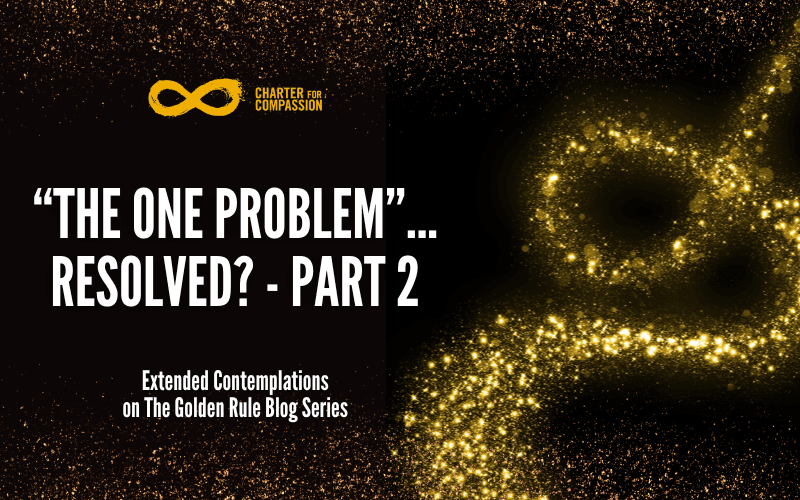
Welcome back, if you read the Part 1 of this blog. If you haven't done that yet, you might want to read Part 1 first to get the whole story, although this second part should make sense if read on its own.
Felipe eventually replied to me with excitement, enthusiasm and appreciation for what I had shared – and also with the revelation that I had not at all addressed his actual "problem" with the Golden Rule, which he did share with me.
Soon after learning that I had, in fact, not addressed his actual "problem" with the Golden Rule, I also realized that I had myself fallen short in applying the high ideal of this Golden Rule that I think I understand pretty well. But, being able to always manifest a high ideal is quite different from simply knowing about a high ideal, and I had just gotten an object lesson about this.
So, I feel that I now want to say this: Felipe, I'm sorry that I did not do as you requested – that I did not first ask you what was bothering you about the Golden Rule. What you requested was for me to ask, instead I made some assumptions and imposed my thoughts on you. I'm sorry for providing what I wanted to give you rather than first asking, in order to open the way for our conversation.
Fortunately, Felipe was very gracious in his reply to me, which served to embrace me and to kindly open the way to our new friendship. And which resulted in his invitation to me to submit some blogs for this newsletter. Thank you, Felipe, for being who you are and for your application of the Golden Rule on my behalf!
So, what follows is what I sent as my response to Felipe's actual "problem" with the Golden Rule:
———————
First, though, I'll allow Felipe to share the "problem" in his own words:
"My issue goes back to the actual statement: Treat others as you want to be treated.
"My issue is the "othering" that the Golden Rule instantly states. I fully believe in the interdependence and interconnectivity of EVERYTHING. Humans, animals, rocks, air, water…
"I believe we are ONE. As I study and practice the Golden Rule, compassion, and our interconnectivity and interdependence between us all, I find there are no "me" and "others" – it's just "US."
"SO HOW DO WE ENCOMPASS OUR ONENESS INTO A STATEMENT THAT "OTHERS" EVERYTHING AGAINST MY/OUR EGO?
"Treat others as I want to be treated… I'm already excluding myself from the oneness I believe we all are part of."
I actually had originally touched slightly on this topic (in my fifth paragraph), although it was definitely not my main focus, when I wrote:
"It is also at this essential level of being where we truly are all one, even while we each are individual in the great diversity of our acquired aspects of being: the body, the heart/emotions, the mind."
Fortunately, I was able to provide a response to Felipe's real issue (again, very slightly edited):
Thank you for your enthusiastic reply, for your kind words, for your clarification, and especially for revealing your one issue with the Golden Rule.
Your issue regarding "other" in light of "oneness" is a common one in spiritual discussions. I have something to share on this which you may find helpful. I'll start off by again quoting the Sufi teacher Hazrat Inayat Khan, even though this isn't directly about oneness or otherness. He wrote:
"The difference between mind and heart is that the mind is the surface of the heart, and the heart the depth of the mind: they are the two different aspects of one and the same thing.
"The mind thinks, the heart feels. What the heart feels, the mind wants to interpret in thought; what the mind thinks, the heart assimilates, expressing it in feeling. Neither is the mind the brain, nor is the heart a piece of flesh hidden under the breast. Those who do not believe in such a thing as the mind think that thoughts and impressions are in the brain, that a person thinks with his brain. It is not true. The brain only helps to make impressions clear to man's material vision.
"The mind does not belong to the same element as the body; the body belongs to the physical, the mind to the mental element; the latter cannot be measured or weighed or made intelligible by physical instruments. Those in the world of science who are trying and hoping one day to produce machines which make thoughts and impressions clear, if ever they are successful, will only be so in the sense that the impressions of thoughts affecting the physical body will be felt by their instruments, but not the thoughts from the mental sphere; for the mind alone is the instrument that can take reflections from the mind. The mind can be seen as five different faculties working together: in thinking, remembering, reasoning, identifying (ego) and feeling."
So, how does this apply to understanding the concept of otherness in the context of oneness? Once again, I don't see a problem with the simultaneous existence of one and other, only a lack of clarity and understanding. I think that there is a parallel here with the above quotation in that otherness is the surface of oneness, and oneness is the depth of otherness: they are two different aspects of one and the same thing.
In the depths of being, we are unequivocally one. In a material sense, we are all stardust that has become clay of Earth and this clay has been brought together and animated in a spiritual sense, with Spirit, with the Great Mystery of Life. We all share this inherent oneness that constitutes the very essence of who we are. It is in and through our essential nature of existence that we are united in oneness. It is in essence that we are intimately and inextricably interconnected and interdependent.
At the same time, though, we are also individuated beings. We each have a physical body, an emotional body and an intellectual body. This makes us identifiable as individuals and also provides us with agency in this material realm where we exist and, ideally, live and thrive, each in our own way.
As such, we are individuated manifestations of oneness, just as separate drops of water are individuated manifestations of the ocean – two aspects of the same thing. One might even consider water vapor in this picture, where the vapor is a third aspect of the same thing, just as spirit is a third aspect of our own individuated being and the One Being.
In this way, there is no real separation due to individuation, only a different perspective due to the appearance of different aspects of that which is. And in the aspect of individuation, there can be relationships between the various individuals, such as in the ways that one individual treats another. The ideal is that all treatment of another individual ought to always be based upon the realization that there is an underlying unity in oneness, such that what affects one also affects all because it affects our inherent unity.
The Golden Rule operates at the superficial level of existence as a reminder to treat others with respect because one ought to respect one's own self, because at our essential level of being we are all one.
Each individuation of the One should treat every individuation of the One with respect.
In this restatement, "every individuation" automatically includes treating the individual self with respect. I'm not sure that this is a very catchy statement, though. For most people, it would probably require a lot of explanation. Not that the original Golden Rule statement doesn't also require a lot of consideration and explanation, as we have been demonstrating here.
———————
Thus went the flow of our email conversation, which is now compiled in Part 1 and Part 2 of this blog, which I hope you have found helpful in some way. Questions and comments are welcome and encouraged, and I will be happy to try to respond, possibly as simple answers or perhaps in the form of a whole blog. And there actually is a plan for me to write a series of blogs about various topics relevant to the Golden Rule, including kindness, compassion, empathy, love. Your questions and comments may help determine the order in which various topics arise and the ways in which I present them. Thank you for reading.
With Love,
Carl Karasti


